There is no cure for a cold or flu – building up your immune system is your best defence.
The old saying, “an ounce of prevention is worth a pound of cure” still applies. The common cold is an infection of the nose and throat that can be caused by any one of more than 300 constantly mutating viruses, while the flu is a more severe infectious disease caused by a family of viruses that affects birds and mammals. The best way to build up your immune system is through the consumption of various vitamins and minerals. Many of these can be factored into your everyday diet, however, with our busy lifestyles which sometimes mean we don’t eat the best foods it is often difficult to make sure all of the essential nutrients are included or even included at the necessary doses.
Following tips will help you and your family stay healthy this winter:
Wash your hands
In a world with public places teeming with contagious viruses and bacteria, our hands can be our greatest source of infection. We are always touching things with our hands and absent-mindedly rubbing our eyes or putting food in our mouths which could introduce an infection into our systems. Wash hands often to help prevent the spread of germs. It’s the flu season. Wash your hands with soap and clean running water for at least 20 seconds.
Avoid sick people
Colds and the flu spread between people via a number of different methods. Avoiding close contact with sick people can help you avoid exposure. Try to stay far enough away that you do not get coughed or sneezed on and avoid touching someone who is sick whenever possible. If you are spending time with people who are ill, make distance the rule and wave or smile instead of shaking hands.
Bundle up to stay dry and warm
Wear appropriate outdoor clothing: light, warm layers, gloves, hats and scarves.
Get plenty of sleep
Sleep allows your body to recharge and gives your immune system a chance to replenish after a long day of fighting off microscopic invaders. Failing to get enough sleep is setting your body up for easy access to infection.
Cut back on the alcohol
Drinking alcohol monopolises the resources that your body should use to prevent infections.
Get your vaccinations
Vaccinations help prevent diseases and save lives. Everyone 6 months and older should get a flu vaccine each year.
Eat healthy, stay active
Eat fruits and vegetables that pack nutrients and help lower the risk for certain diseases. Keep a variety of fruits in your dining table. Limit your portion sizes and foods high in fat, salt, and sugar.
Drink lots of water
Your body will function better if not starved for its most important molecule. Your body is made up of about 60% water and is constantly using water for all vital processes. Replenish your body’s water supply to help yourself run at maximum capacity.
Take vitamins and supplement
While many vitamins can be helpful supplements to your diet, Vitamin D is probably the most important, at least during the winter months. Vitamin D is absorbed into your body right from the sun’s rays, but in the winter months, more time is spent indoors than usual and supplements can help make up the difference. Consult your doctor and take necessary tests before taking supplements.
Eat more fruits and vegetables
This helps vary your diet and allows you to get the vitamins with which fruits and veggies are rich. Giving your body the tools to stay healthy is half the battle, and eating fruits and veggies certainly does this.
Prepare food safely
Remember these simple steps: Wash hands and surfaces often, avoid cross-contamination, cook foods to proper temperatures and refrigerate foods promptly.
Protect you skin
Avoid harsh, drying soaps. It’s best to use cleansing creams or gentle skin cleansers and bath or shower gels with added moisturisers. Apply moisturisers immediately after bathing. Gently pat your skin dry with a towel so that some moisture remains. Immediately moisturise your skin with an oil or cream to help trap water in the surface cells.
Listen to your body
Your body will give you a warning when it’s beginning to succumb to an infection. Whether that warning is a headache, a bad mood or feeling uncharacteristically tired, respond to these warnings by making sure you are keeping up with all the other tips.
Health check-up
Getting frequent health check-ups during the winter are especially important, owing to a number of health risks that come with the cold weather. The link between winter and heart problems starts in the blood vessels. This is because during the chilly season, cold causes the blood vessels to contract, hence transporting less blood to the heart. Furthermore, winter means more exertion, such as walking in heavy clothes and shoes, and maintaining balance.
* Dr Sobhana Subbaiah, MBBS,
DNB (Family Medicine),
is a Family Physician with
Aster Medical Centre on C Ring Road

